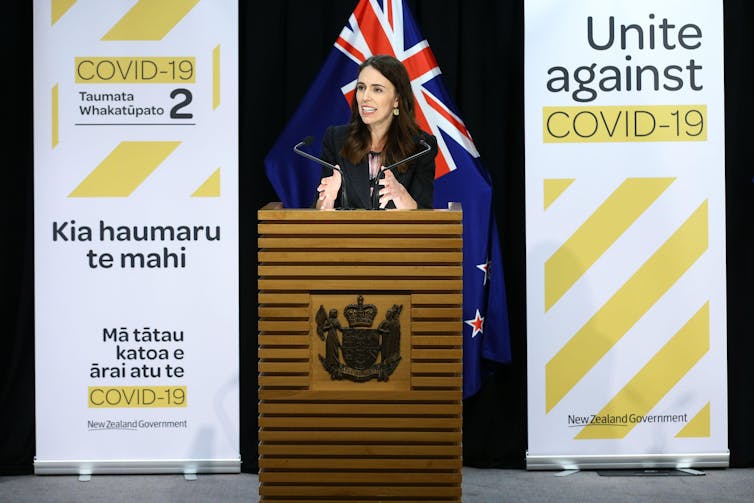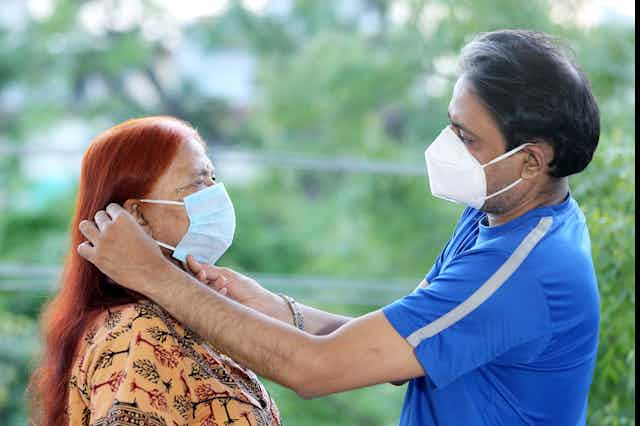As COVID-19 cases and deaths continue to rise and vaccine uptake emerges as a critical way out of lockdown, pressure to get more people to obey the guidelines becomes ever more urgent.
Campaigns and leaders’ messages aimed at encouraging people to follow rules have tried to persuade the public that the threat is serious. Yet, decades of research show that when times are uncertain or threatening, people adapt their behaviour according to what those around them do. Studies on social norms show that, thanks to our social nature, we accept new social rules only if others around us do, creating a tricky, circular problem when nobody wants to go first.
During the pandemic, national leaders seem to have turned a blind eye to the social principles guiding human behaviour. Many campaigns in northern hemisphere countries have targeted individuals in propaganda style: “We want YOU to do the right thing.”
Some countries, however, have taken a different path. Singapore, China and South Korea seemed more focused on moving the people together as a single unit. The same is arguably true of other western cultures, such as New Zealand and Australia, whose strategies have focused on social cohesion.
Seeing these national differences, we conducted a global study to investigate what most effectively brings people on board in this moment of crisis. From April to June 2020, over 6500 participants from 110 countries completed our online survey. We asked people how much they, their friends and their fellow citizens approved of and followed the COVID-19 guidelines in their country. We weren’t interested in the actual behaviour of their friends or fellow citizens, but what our respondents thought others were doing. This is crucial as people are more likely to accept new social rules when they have high expectations that others are following the rules too.

Our findings went against the individualist assumptions of many governments: people who followed guidelines the most were not those who found the rules more justified, or those who were more vulnerable to the disease. The most diligent rule followers were, consistently, those whose friends and families were following the rules. What’s more, people who were more vulnerable to COVID-19 were more likely to follow the guidelines if they had a larger social circle. These findings applied across age groups, genders, countries, and was independent of the strength of local restrictions.
Rolling with the nation
What about fellow citizens? Our results reveal that when fellow citizens followed the guidelines, it mattered hugely to people who felt a strong bond with their country. For these people, countries fulfilled a similar role to family.
This highlights the crucial role a person’s feelings about their country can play in their response to the pandemic. When national figures are seen to flout the rules, for people who feel a strong bond to their country, this is conceivably like seeing a family member break the rules, which can then lead to them losing trust and breaking the rules themselves. This has been dubbed, “the Cummings effect”.
The pandemic, and our results, bring a clear message: humans are social, but the way they socialise is varied. Bonds that link us to our families and friends, but also to more abstract entities, like our nation, significantly affect our behaviour.
What can we do differently?
Going forward, marked changes in public messaging are needed to encourage people to stick to COVID-19 restrictions. We recommend that governments don’t appeal to individual responsibility or vulnerability, and instead emphasise shared values, such as working in unison for the benefit of the community.
As friends and families matter to us all, practical next steps in the pandemic could include the use of social apps or badges, similar to exercise apps, which tell people whether their close friends are enrolled for the vaccine. On social media, rather than expressing outrage at people who aren’t following the rules, it would be more effective to provide positive, encouraging examples of compliance to bring others on board.
What is evident for our fight against the virus is that even when the challenge is to practise social distancing, social closeness is the solution – local bonds are at the heart of solving the the challenges we will continue to face.


